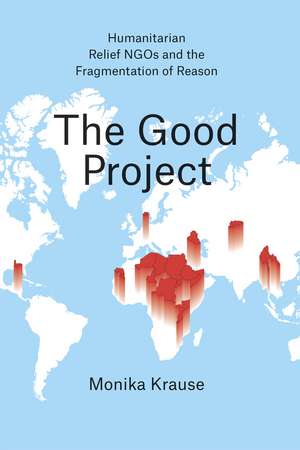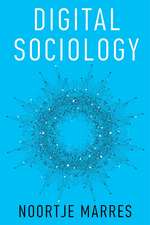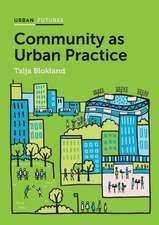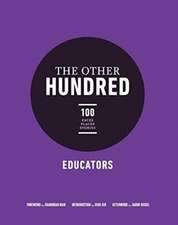The Good Project: Humanitarian Relief NGOs and the Fragmentation of Reason
Autor Monika Krauseen Limba Engleză Paperback – 20 iun 2014
NGOs set out to save lives, relieve suffering, and service basic human needs. They are committed to serving people across national borders and without regard to race, ethnicity, gender, or religion, and they offer crucial help during earthquakes, tsunamis, wars, and pandemics. But with so many ailing areas in need of assistance, how do these organizations decide where to go—and who gets the aid?
In The Good Project, Monika Krause dives into the intricacies of the decision-making process at NGOs and uncovers a basic truth: It may be the case that relief agencies try to help people but, in practical terms, the main focus of their work is to produce projects. Agencies sell projects to key institutional donors, and in the process the project and its beneficiaries become commodities. In an effort to guarantee a successful project, organizations are incentivized to help those who are easy to help, while those who are hardest to help often receive no assistance at all. The poorest of the world are made to compete against each other to become projects—and in exchange they offer legitimacy to aid agencies and donor governments. Sure to be controversial, The Good Project offers a provocative new perspective on how NGOs succeed and fail on a local and global level.
In The Good Project, Monika Krause dives into the intricacies of the decision-making process at NGOs and uncovers a basic truth: It may be the case that relief agencies try to help people but, in practical terms, the main focus of their work is to produce projects. Agencies sell projects to key institutional donors, and in the process the project and its beneficiaries become commodities. In an effort to guarantee a successful project, organizations are incentivized to help those who are easy to help, while those who are hardest to help often receive no assistance at all. The poorest of the world are made to compete against each other to become projects—and in exchange they offer legitimacy to aid agencies and donor governments. Sure to be controversial, The Good Project offers a provocative new perspective on how NGOs succeed and fail on a local and global level.
Preț: 184.18 lei
Nou
Puncte Express: 276
Preț estimativ în valută:
35.25€ • 36.41$ • 29.33£
35.25€ • 36.41$ • 29.33£
Carte disponibilă
Livrare economică 04-18 martie
Livrare express 15-21 februarie pentru 22.01 lei
Preluare comenzi: 021 569.72.76
Specificații
ISBN-13: 9780226131368
ISBN-10: 022613136X
Pagini: 240
Ilustrații: 14 line drawings, 2 tables
Dimensiuni: 152 x 229 x 18 mm
Greutate: 0.31 kg
Editura: University of Chicago Press
Colecția University of Chicago Press
ISBN-10: 022613136X
Pagini: 240
Ilustrații: 14 line drawings, 2 tables
Dimensiuni: 152 x 229 x 18 mm
Greutate: 0.31 kg
Editura: University of Chicago Press
Colecția University of Chicago Press
Notă biografică
Monika Krause teaches sociology at Goldsmiths, University of London.
Cuprins
List of Figures and Tables
Acknowledgments
Acknowledgments
Introduction
1. In Pursuit of the Good Project
2. Beneficiaries as a Commodity
3. The Logframe and the History of the Market for Projects
4. The History of Humanitarian Authority and the Divisions of the Humanitarian Field
5. The Reform of Humanitarianism
6. What about Human Rights?
Conclusion
1. In Pursuit of the Good Project
2. Beneficiaries as a Commodity
3. The Logframe and the History of the Market for Projects
4. The History of Humanitarian Authority and the Divisions of the Humanitarian Field
5. The Reform of Humanitarianism
6. What about Human Rights?
Conclusion
Appendix on Methods
Bibliography
Index
Recenzii
“The Good Project is a highly welcome and original contribution to our knowledge of contemporary humanitarianism. Drawing from sociological institutionalism and Pierre Bourdieu, and positioning herself between studies that fetishize humanitarian ideas and critiques that vilify the compromise of those ideals, Krause uncovers some of the central practices and driving logics of really, existing, humanitarianism. By studying what humanitarians do, Krause's reveals an unexplored side of what humanitarianism has become.”
“This is an urgently important book. It explains how humanitarian organizations work, do their work, and why that work succeeds or fails. It also offers fresh insights into the rationality of bureaucracies—an analysis in depth written in clear, evocative prose.”
“Krause’s The Good Project is a powerfully original analysis of humanitarian relief organizations like MSF and the ICRC. Observing closely the practical logic through which these NGOs manage their activities, Krause addresses crucial questions: How do NGOs assess what is a ‘good’ project? Why are some beneficiaries more worthy of help than others? How do relief organizations decide where they should work? How do these organizations position themselves in the field of humanitarian relief as a whole? Even as Krause shows how NGOs compete in a market for projects, with beneficiaries served as the commodity for which funders pay, she creates a vivid picture of the complex humanity–and the strategic interactions–of both NGO staff and the refugees and victims they serve. Poignant and funny in places, the book is a great piece of original sociological theorizing.”
“The Good Project fills a gap in the humanitarian NGO literature by exploring how these organizations actually do their work. . . . Recommended.”
“Can yet another critique of the aid business contribute anything new? Krause has done so. . . . Krause has written an excellent, wide-ranging, and cogent contribution to the debate on humanitarian practice.”
“With this theoretically ambitious and empirically rich account of the practices of humanitarian relief organizations, The Good Project makes a powerful case for focusing on relief organizations themselves rather than assuming that they function as vehicles for the ideals and interests of either donors or states.”












